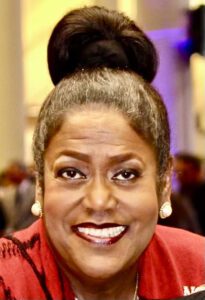[ad_1]
Inside The Center March 2024- Supporter Spotlight
 Our March Supporter Spotlight features Ingrid Saunders Jones, a respected leader committed to empowering communities. She has guided organizations such as The Coca-Cola Foundation, the National Council of Negro Women, and the YWCA of Greater Atlanta.
Our March Supporter Spotlight features Ingrid Saunders Jones, a respected leader committed to empowering communities. She has guided organizations such as The Coca-Cola Foundation, the National Council of Negro Women, and the YWCA of Greater Atlanta.
Jones has supported The National Center for Civil and Human Rights since its inception and played a pivotal role in The Coca-Cola Company’s decision to provide land for the museum. Jones served on The Center’s board for 11 years and helped shape the organization’s mission and vision. In 2024, The Center recognized her steadfast dedication by honoring her as its second emeritus board member.
During Women’s History Month, we asked Jones to reflect on leadership, the significance of mentorship, and what drives her ongoing passion for promoting thriving communities.
Why is it important to celebrate Women’s History Month?
We must illuminate this history, especially the unsung heroes of the civil rights movement, as The Center did for its 2023 Power to Inspire event. It makes people say, “I didn’t know she was involved,” and want to learn more. I’m so pleased we lifted Myrlie Evers Williams, but there are many more. And we’ve lost so many, like my friend Connie Curry, who worked for Mayor Jackson. Women have been the backbone of many significant Atlanta civic organizations, and it is essential to acknowledge their contributions.
Who are some women who have inspired you?
There are multitudes, but two major people who immediately come to mind are Coretta Scott King and Alana Shepherd. Coretta started from scratch and said, “We’re going to remember my husband.” She fulfilled that promise and built an institution, creating the King Center and a national park.
Alana founded the Shepherd Center after her son sustained a spinal cord injury, realizing that Atlanta lacked adequate care. The Shepherd Center has since provided specialized care for thousands.
Who is a woman who personifies leadership?
I think of Shirley Franklin’s leadership and her impact on the city of Atlanta. Her knowledge of how to get things done and her ability to partner led to the construction and expansion of The Center. Through her leadership, she was able to convince skeptics and inspire others. Franklin also tackled important infrastructure issues, such as the sewers, during her time as a leader in Atlanta. The Center is one of her many accomplishments, and it serves as a testament to her legacy.
How has mentorship influenced your career?
Mentorship has always been important to me. Through mentors, there is a direct connection between my role as a nonprofit leader in Detroit and my work for the Atlanta City Council president, going to work for Mayor Jackson, and then working at the Coca-Cola Company. I was directly mentored by my boss, Carl Ware, and indirectly by Chairman Roberto Goizueta. When I speak with young people, the key to earning mentorship is demonstrating a strong work ethic and the ability to get things done. I was learning even if they didn’t know they were mentoring me.
What advice have you carried through your career?
You’ve got to know what is happening in the world – to engage specifically where you are, but also more broadly to understand critical data so that you can dimensionalize solutions. You cannot live in a bubble.
What advice would you give to aspiring leaders?
When you become a boss, you are responsible for making everybody who works for you successful. In my career, I was surprised by the number of people who did not understand that.
What causes are you passionate about now?
Since retiring ten years ago, I’ve slowly but surely narrowed my focus. My passion project is reopening the YWCA Phyllis Wheatley Building to serve as a community epicenter for Atlanta’s Westside, providing daycare and skills training for working parents. The wealth gap in Atlanta is growing, and we must, as a community, be intentional about mitigating that.
[ad_2]




